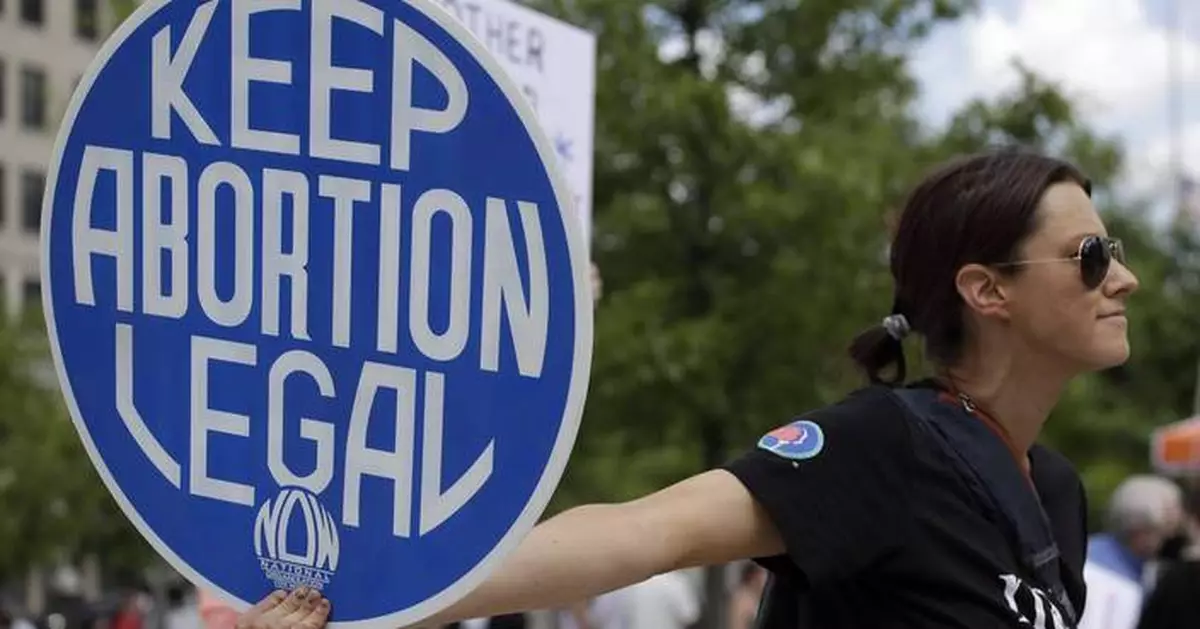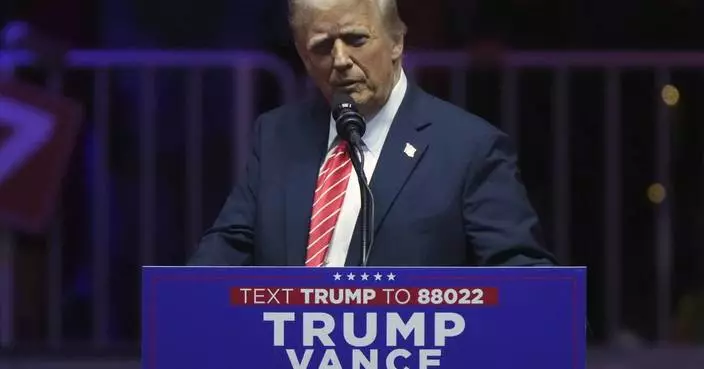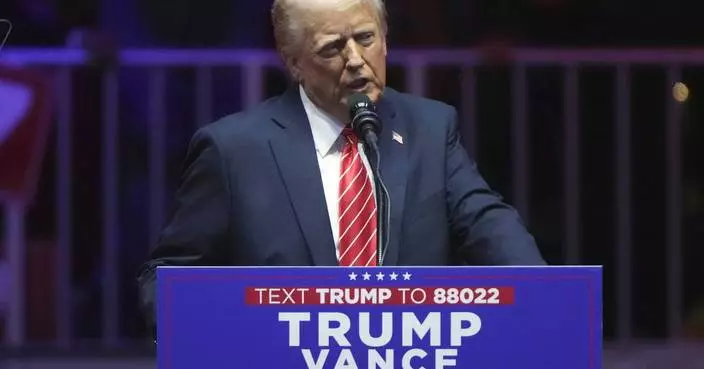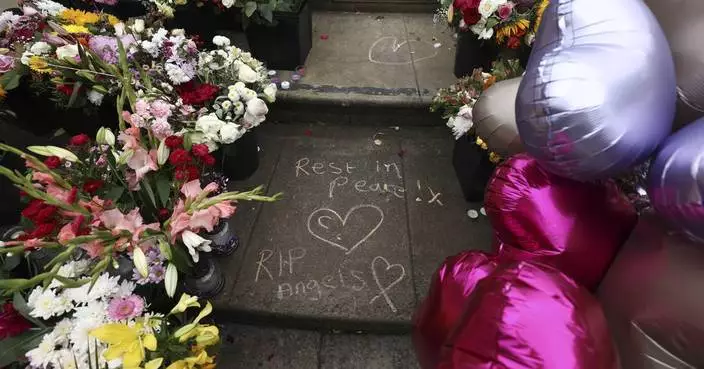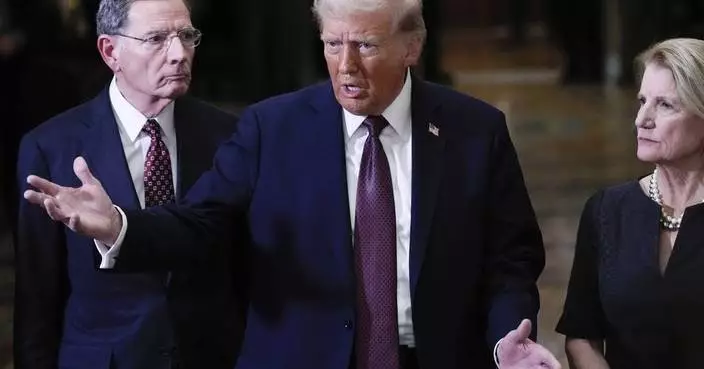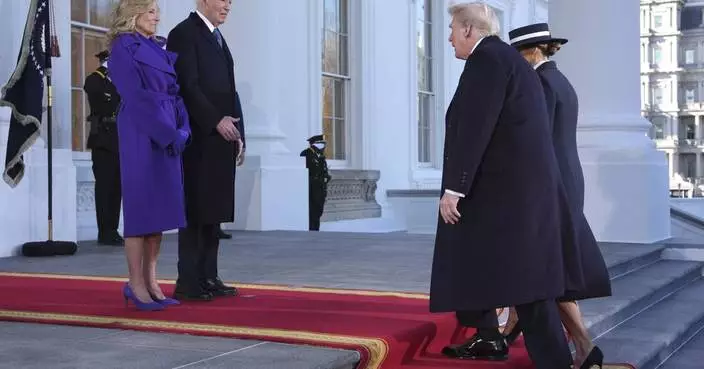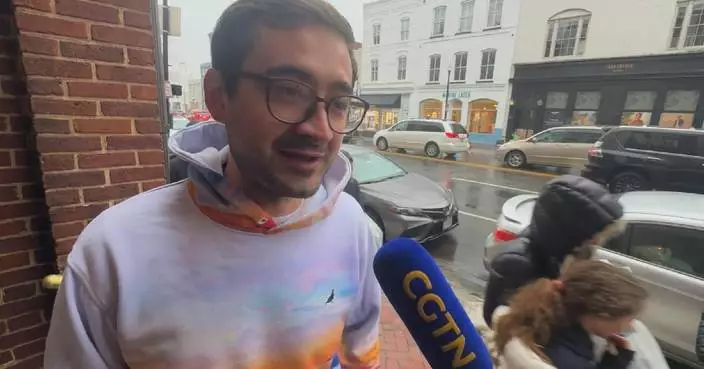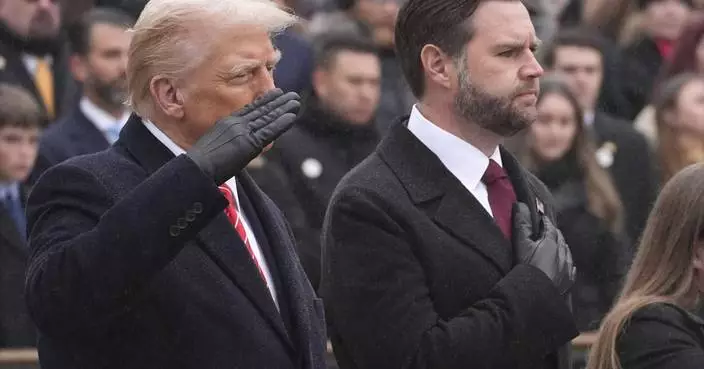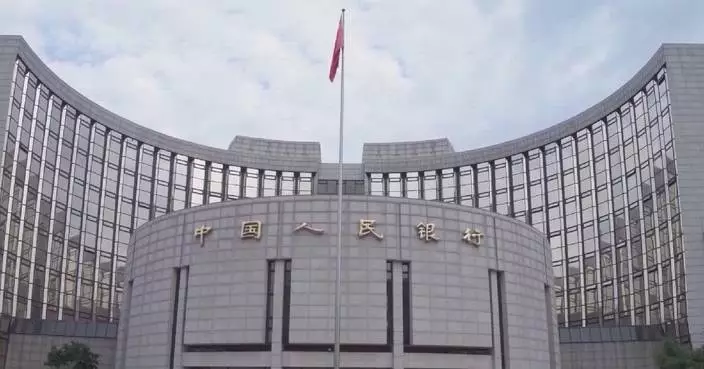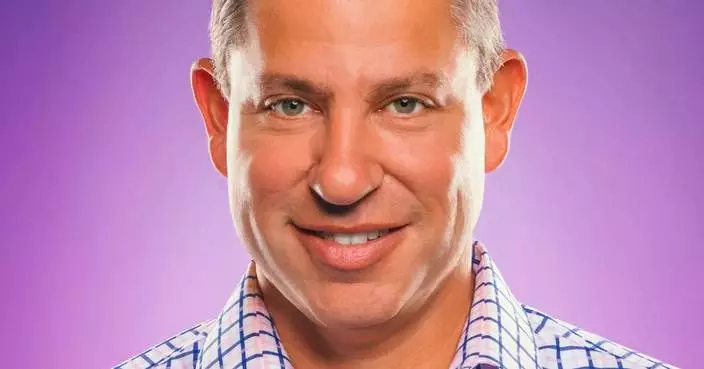NASHVILLE, Tenn. (AP) — A federal judge on Friday temporarily blocked Tennessee from enforcing a law banning adults from helping minors get an abortion without parental permission.
In a 49-page ruling, U.S. District Judge Aleta Trauger argued that the Republican-controlled state cannot “make it a crime to communicate freely” about legal abortion options even in a state where abortion is banned at all stages of pregnancy except for a handful of situations. Trauger's decision means that the law will be placed on hold as the case make its way through court.
“The Tennessee General Assembly apparently determined that, when the topic at hand is ‘abortion trafficking,’ the best interests of the pregnant child are not merely a secondary consideration, but unworthy of particularized consideration at all,” Trauger wrote.
Earlier this year, Tennessee’s Republican lawmakers and GOP Gov. Bill Lee signed off on a proposal making it illegal for an adult who “intentionally recruits, harbors, or transports” a pregnant child or teen within the state to get an abortion without consent from the minor’s parents or guardians. Those convicted of breaking the law risked being charged with a Class A misdemeanor, which requires a nearly one-year jail sentence.
The law, which went into effect July 1, did not contain exemptions for minors who may have been raped by their parents or guardians. Instead, the statute dictated that biological fathers who cause the pregnancy of their daughters, if minors, couldn't pursue legal actions.
The Tennessee law mimicked the so-called “ abortion trafficking ” law enacted in Idaho last year, the first state to ever enact such a statute. However, a federal judge has since temporarily blocked Idaho's version as the case moves through court.
Just before the law was poised to go into effect, Democratic Rep. Aftyn Behn and Nashville attorney Rachel Welty filed a lawsuit on the second anniversary of the Supreme Court’s decision overturning Roe v. Wade, the 1973 decision that had guaranteed a constitutional right to abortion.
Behn called the Tennessee ruling a “monumental victory for free speech and the fight for abortion rights.
“This ruling doesn't just protect Tennesseans — it safeguards the freedom to discuss abortion care across state lines, ensuring that we can continue to offer support, share accurate information, and stand up for the rights of those seeking essential health care everywhere,” she said.
A spokesperson for Attorney General's office, who was fighting to get the case dismissed, did not immediately respond to an emailed request for comment on Friday's ruling.
Trauger's decision sided with Welty and Behn's argument that the Tennessee law was "unconstitutionally vague,” specifically stressing that the word “recruits” is undefined in the statute.
Trauger also raised several First Amendment concerns in her explanation that her ruling would apply across the state, not just to Welty and Behn.
“The freedom of speech guaranteed by the First Amendment is not simply a special protection that the Constitution grants to a few, high-profile speakers so that those speakers can hear themselves talk; it is a protection available to everyone, for the interconnected benefit of everyone, because messages do not gain their fullest power by being uttered, but by being spread,” Trauger wrote.
Tennessee bans abortions at all stages of pregnancy, but there are exemptions in cases of molar pregnancies, ectopic pregnancies, and to remove a miscarriage or to save the life of the mother. Notably, doctors must use their “reasonable medical” judgment — a term that some say is too vague and can be challenged by fellow medical officials — in deciding whether providing the procedure can save the life of the pregnant patient or prevent major injury.
A group of women is currently suing in a separate case to clarify the state’s abortion ban. A court decision is expected soon on whether the lawsuit can continue or if Tennessee's abortion ban can be placed on hold as the legal battle continues.
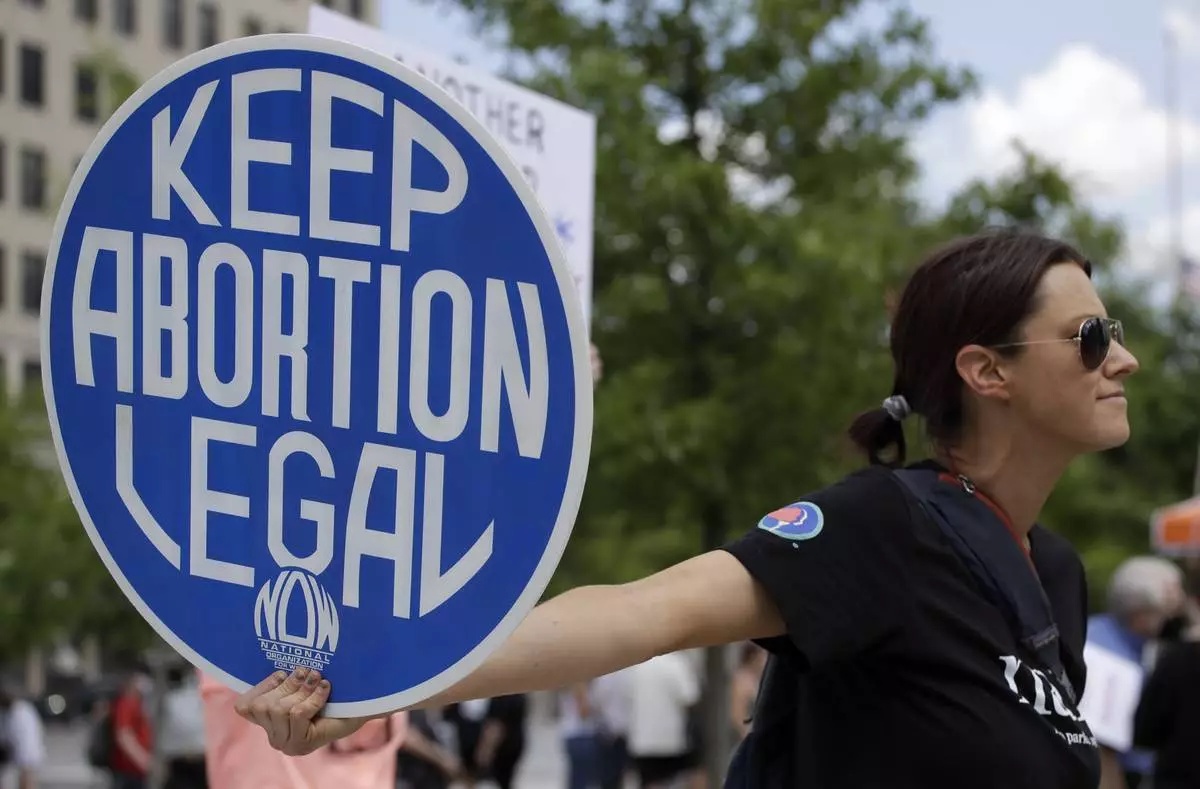
FILE - An. Abortion rights demonstrator holds a sign during a rally on May 14, 2022, in Chattanooga, Tenn. (AP Photo/Ben Margot, File)
WASHINGTON (AP) — The price of bitcoin surged to over $109,000 early Monday, just hours ahead of President-elect Donald Trump’s inauguration, as a pumped up cryptocurrency industry bets he'll take action soon after returning to the White House.
Once a skeptic who said a few years ago that bitcoin “ seems like a scam,” Trump has embraced digital currencies with a convert’s zeal. He's launched a new cryptocurrency venture and vowed on the campaign trail to take steps early in his presidency to make the U.S. into the “crypto capital” of the world.
His promises including creating a U.S. crypto stockpile, enacting industry-friendly regulation and event appointing a crypto “czar” for his administration.
“You’re going to be very happy with me,” Trump told crypto-enthusiasts at a bitcoin conference last summer.
Bitcoin is the world’s most popular cryptocurrency and was created in 2009 as a kind of electronic cash uncontrolled by banks or governments. It and newer forms of cryptocurrencies have moved from the financial fringes to the mainstream in wild fits and starts.
The highly volatile nature of cryptocurrencies as well as their use by criminals, scammers and rogue nations, has attracted plenty of critics, who say the digital currencies have limited utility and often are just Ponzi schemes.
But crypto has so far defied naysayers and survived multiple prolonged price drops in its short lifespan. Wealthy players in the crypto industry, which felt unfairly targeted by the Biden administration, spent heavily to help Trump win November’s election. Bitcoin has surged in price since Trump's victory, topping $100,000 for the first time last month before briefly sliding down to about $90,000. On Friday, it rose about 5%. It jumped more than $9,000 early Monday, according to CoinDesk.
Two years ago, bitcoin was trading at about $20,000.
Trump’s picks for key cabinet and regulatory positions are stocked with crypto supporters, including his choice to lead the Treasury and Commerce departments and the head of the Securities and Exchange Commission.
Key industry players held a first ever "Crypto Ball” on Friday to celebrate the first “crypto president." The event was sold out, with tickets costing several thousand dollars.
Here’s a look at some detailed action Trump might take in the early days of his administration:
As a candidate Trump promised that he would create a special advisory council to provide guidance on creating “clear” and “straightforward” regulations on crypto within the first 100 days of his presidency.
Details about the council and its membership are still unclear, but after winning November’s election, Trump named tech executive and venture capitalist David Sacks to be the administration’s crypto “czar.” Trump also announced in late December that former North Carolina congressional candidate Bo Hines will be the executive director of the “Presidential Council of Advisers for Digital Assets.”
At last year’s bitcoin conference, Trump told crypto supporters that new regulations “will be written by people who love your industry, not hate your industry.” Trump's pick to lead the SEC, Paul Atkins, has been a strong advocate for cryptocurrencies.
Crypto investors and companies chafed as what they said was a hostile Biden administration that went overboard in unfair enforcement actions and accounting policies that have stifled innovation in the industry — particularly at the hands of outgoing SEC Chairman Gary Gensler.
“As far as general expectations from the Trump Administration, I think one of the best things to bet on is a tone change at the SEC,” said Peter Van Valkenburgh, the executive director of the advocacy group Coin Center.
Gensler, who is set to leave as Trump takes office, said in a recent interview with Bloomberg that he’s proud of his office’s actions to police the crypto industry, which he said is “rife with bad actors.”
Trump also promised that as president he’ll ensure the U.S. government stockpiles bitcoin, much like it already does with gold. At the bitcoin conference earlier this summer, Trump said it the U.S. government would keep, rather than auction off, the billions of dollars in bitcoin it has seized through law enforcement actions.
Crypto advocates have posted a draft executive order online that would establish a “Strategic Bitcoin Reserve” as a “permanent national asset” to be administered by the Treasury Department through its Exchange Stabilization Fund. The draft order calls for the Treasury Department to eventually hold at least $21 billion in bitcoin.
Republican Sen. Cynthia Lummis of Wyoming has proposed legislation mandating the U.S. government stockpile bitcoin, which advocates said would help diversify government holdings and hedge against financial risks. Critics say bitcoin’s volatility make it a poor choice as a reserve asset.
Creating such a stockpile would also be a “giant step in the direction of bitcoin becoming normalized, becoming legitimatized in the eyes of people who don’t yet see it as legitimate,” said Zack Shapiro, an attorney who is head of policy at the Bitcoin Policy Institute.
At the bitcoin conference earlier this year, Trump received loud cheers when he reiterated a promise to commute the life sentence of Ross Ulbricht, the convicted founder of the drug-selling website Silk Road that used crypto for payments.
Ulbricht’s case has energized some crypto advocates and Libertarian activists, who believe government investigators overreached in building their case against Silk Road.
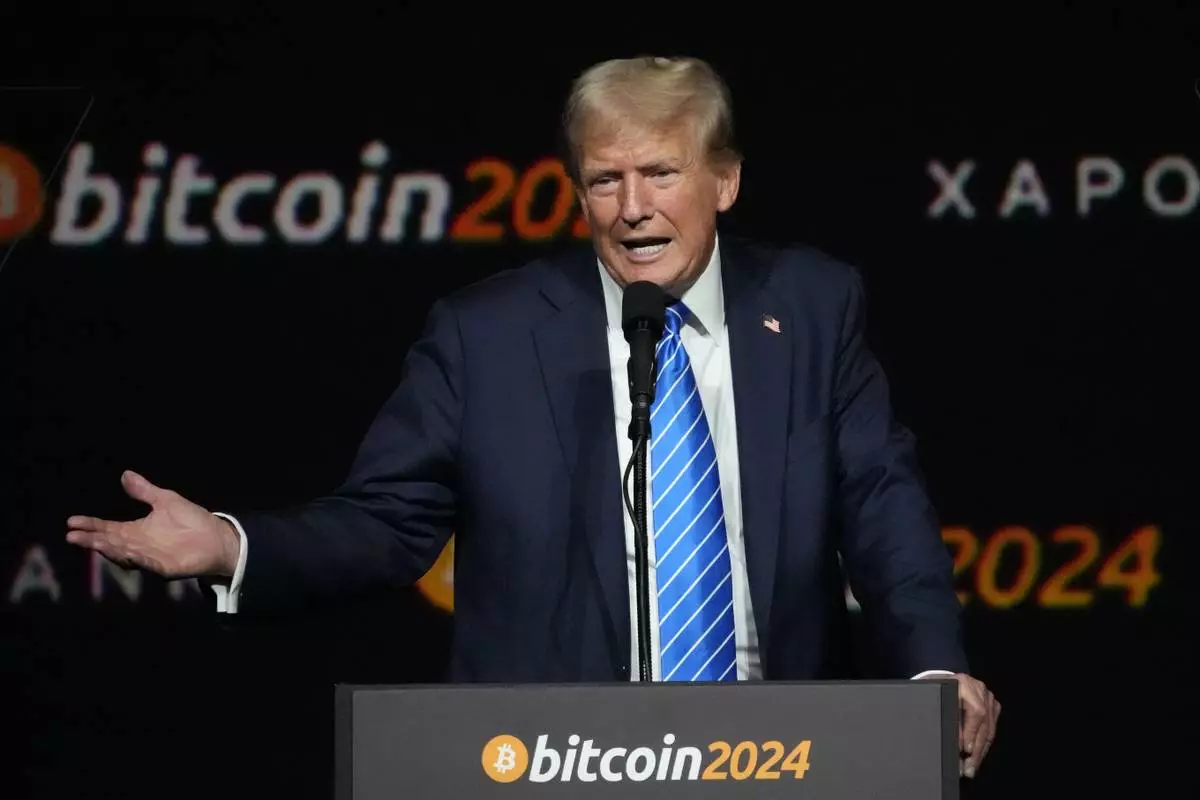
FILE - Donald Trump speaks at the Bitcoin 2024 Conference July 27, 2024, in Nashville, Tenn. (AP Photo/Mark Humphrey, File)



